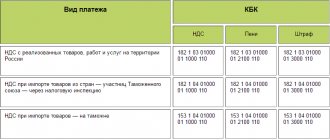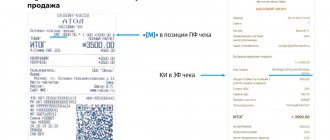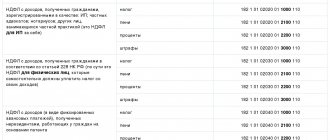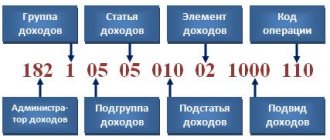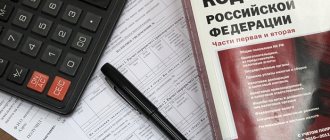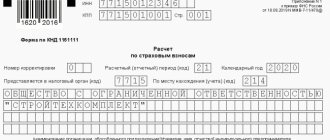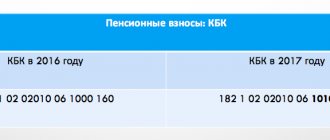What is a tax benefit
The legislation of the Russian Federation does not have a clear interpretation of the concept of “ tax benefit ”. Therefore, most often this term refers to either the ability to pay less tax or the opportunity not to pay it at all. At the same time, the taxpayer may refuse such a benefit or stop using it for some period.
Speaking specifically about VAT, the Tax Code of the Russian Federation does not have an unambiguous list of reliefs and benefits applicable to it. But some general points still exist. Let's look at them below.
VAT benefits
First of all, it is worth saying that most tax specialists consider VAT benefits to include:
- the right of enterprises and individual entrepreneurs to carry forward past losses to future periods;
- the ability to apply depreciation bonuses;
- when providing services not on the territory of the Russian Federation (even if there is no object of taxation), it is possible not to charge VAT.
But contrary to established practice, strictly speaking, the items listed here cannot be fully attributed to VAT benefits, since other taxpayers are also entitled to them. Therefore, the main benefit of VAT is only the possibility of exemption from its payment.
Who can claim VAT exemption
As Article 145 of the Tax Code of the Russian Federation says, to be exempt from VAT, individual entrepreneurs and enterprises must meet the following criteria:
- at least 3 months have passed since registration with the state;
- excluding VAT, the company’s profit for 3 months amounted to no more than 2 million rubles;
- goods subject to excise duty are not used in sales, or when working with them, separate records are kept in excisable and non-excise categories.
Attention! It should be noted that the Ministry of Finance believes that the final amount of revenue must be calculated with full accounting of sales of goods, both excisable and non-excise, as well as transactions that are not recognized as objects of VAT and are not subject to this type of tax.
Where to start exempting from VAT
After the accounting department of the enterprise is convinced that there are no obstacles to getting rid of VAT, it is necessary to make preliminary preparations, namely, to restore the VAT previously accepted for deduction according to:
- fixed assets;
- tangible assets;
- intangible assets.
This must be done immediately before starting the VAT exemption procedure, that is, in the last tax period.
It should be taken into account that:
- if fixed assets are “under-depreciated”, then VAT must be restored from their residual value;
- If VAT is paid on advances made by buyers, then it can be refunded, but only if the buyers do not object to:
- or terminate the contractual relationship and return the advance in full;
- or add a price change clause to the contract - in this case, you can return the advance VAT.
If the buyer, for some reason, does not want to make changes to the contract, then upon shipment of the goods he needs to be issued an invoice with VAT.
And we must always remember that as soon as the period of VAT exemption begins, it will no longer be possible to deduct VAT paid on previously made advances.
Changes to the list of VAT-free transactions that came into force on 01/01/2013
Article 3 of Law No. 145-FZ, paragraph 2 of Article 149 of the Tax Code, was supplemented with paragraph 12.2.
In accordance with clause 2 of Article 149 of the Tax Code of the Russian Federation, the sale (as well as the transfer, performance, provision for one’s own needs) on the territory of the Russian Federation of the following services provided on the securities market, commodity and currency markets is not subject to taxation (exempt from taxation) (clause 12.2):
- services provided by registrars, depositories, including specialized depositories and the central depository, dealers, brokers, securities managers, management companies of investment funds, mutual funds and non-state pension funds, clearing organizations, trade organizers on the basis of licenses to carry out relevant types of activities;
- services provided by the organizations specified in paragraph two of this subclause, directly related to the services they provide within the framework of licensed activities (according to the list established by the Government of the Russian Federation);
- services for conducting, monitoring and accounting for commodity deliveries under obligations admitted to clearing, provided by commodity supply operators that have received accreditation in accordance with Federal Law No. 7-FZ of February 7, 2011 “On Clearing and Clearing Activities”;
- services for accepting obligations to be included in the clearing pool, provided by central counterparties on the basis of a license to carry out clearing activities or subject to their receipt of accreditation in accordance with Federal Law No. 7-FZ of February 7, 2011 “On Clearing and Clearing Activities” ;
- services for maintaining prices, demand, supply and (or) the volume of organized trading provided by market makers in accordance with the Federal Law of November 21, 2011 No. 325-FZ “On Organized Trading”.
Please note: When changing the wording of paragraphs 1 - 3 of Article 149 (cancellation of tax exemption or classifying taxable transactions as non-taxable transactions), taxpayers apply the procedure for determining the tax base (or tax exemption) that was in effect on the date of shipment of goods (works, services) regardless of the date of payment (clause 8 of Article 149 of the Tax Code of the Russian Federation).
In addition, changes were made to the first paragraph of paragraph 2 of clause 3 of Article 149 of the Tax Code of the Russian Federation, namely the phrase “(except for brokerage and other intermediary services)” now reads as “(except for brokerage and other intermediary services not specified in subclause 12.2 of clause 2 of this article).”
Also, in paragraph 4 of Article 169 of the Tax Code of the Russian Federation, similar changes were made:
- the phrase “(with the exception of brokerage and intermediary .
What documents are needed for VAT exemption?
From individual entrepreneurs and organizations that want to save themselves from paying VAT, tax authorities require:
- notification in writing in a strictly defined format;
- log of control over the movement of invoices and its copy;
- extracts: from the balance sheet - from the LLC, from the book of income and expenses - from the individual entrepreneur, and an extract from the book of sales and purchases from both.
All of the above documents must be submitted to the territorial tax service no later than the 20th day of the month from which individual entrepreneurs or organizations no longer want to pay VAT.
For your information! An important feature of the VAT exemption is the fact that it can be obtained at any time, and not just at the beginning of a new tax period.
As soon as an enterprise or individual entrepreneur applying for an exemption from VAT receives it, he can sleep peacefully for one year - the exemption period is fixed at 12 consecutive months. Input VAT at this time must be taken into account in the cost of work, services and goods.
Persons exempt from taxpayer duties and conditions for exemption
Current tax rules and regulations establish a certain circle of persons who can exercise the legal right to be exempt from tax obligations. This list includes heads of organizations, institutions, as well as other legal entities, and individual entrepreneurs registered with the tax authority.
In addition, the right to exemption from tax obligations to pay VAT is also affected by certain conditions , the list of which is also established by the current tax regulations. The main condition is directly related to the amount of revenue received by an individual entrepreneur or organization for a certain time period.
If in the three consecutive months that preceded the taxpayer’s application to the tax authority to obtain an exemption, the amount of revenue did not exceed two million rubles, the exemption from the taxpayer’s duties may be approved and formalized by the relevant tax authority.
In this case, the amount of revenue will mean the total profit from the professional activity of the applicant - from the sale or sale of certain goods, provision of services or performance of work for the corresponding tax period.
Responsibilities of the VAT payer during the period of exemption from its payment
Despite the permission not to pay VAT, not to issue invoices to buyers, and therefore not to submit the corresponding declarations, taxpayers still have some obligations. Namely, they must:
- keep a book of sales and purchases;
- keep a journal of invoices;
- issue invoices to contractors for shipments marked “without VAT”;
- issue invoices with the allocated tax amount;
- pay VAT if goods are imported from outside the Russian Federation;
- act as a tax agent for VAT;
- fill out and provide local tax specialists with a return for those quarters in which VAT was applied.
It is necessary to strictly monitor the implementation of these operations, since if the regulatory authorities detect neglect of them, administrative punishment in the form of fines may follow.
Shopping with coronavirus subsidies
In connection with the coronavirus, subsidies were allocated from the federal budget to small businesses, including VAT taxpayers:
- included as of March 1, 2021 in the unified register of small and medium-sized businesses;
- operating in sectors of the economy that were most affected by the worsening situation as a result of the spread of this infection (according to the list approved by Government Decree No. 434 on April 3, 2021).
Such taxpayers, when purchasing goods (work, services), property rights at the expense of the specified subsidies covering the amount of input or customs VAT:
- are not deprived of the right to apply VAT deduction;
- should not restore the amount of VAT legally accepted for deduction when receiving subsidies for reimbursement of previously incurred costs, including tax (or for the payment of customs VAT).
Federal Law No. 121-FZ of April 22, 2021 established that from April 22, 2021, receiving a “coronavirus” subsidy does not interfere with VAT deduction and does not require VAT restoration.
When the right to exemption from VAT is lost
In some cases, a taxpayer who has already received the right not to pay VAT may lose it. This happens in cases where:
- the profit of an individual entrepreneur or enterprise is above 2 million rubles for three months in a row;
- sales of excisable goods appear.
Important! When assessing the amount of revenue, tax specialists also look at those periods that extend beyond the exemption period.
Attention! Those individual entrepreneurs and LLCs that, during the exemption from VAT, switched to UTII or the simplified tax system, may no longer submit documents to confirm the right to exemption from VAT.
The procedure for getting rid of VAT is not the most complicated matter; it requires a careful approach. Therefore, if there is uncertainty about the advisability of using it, for example, due to plans for business development and increasing turnover, it would be wiser to simply switch to another tax system, for example, the simplified tax system. However, in cases where the transition to other tax regimes is impossible, VAT exemptions are an excellent way to reduce the burden on an enterprise for tax accounting and reporting, as well as payment of taxes.
How to bring order to tax reporting?
It is most effective to contact a company that professionally provides consulting services on tax payments and reporting or immediately order full support. We invite you to visit us!
Why do they trust us?
- Extensive work experience. It helps us know in advance all the pitfalls of taxation and reporting, as well as avoid many common mistakes.
- Multidisciplinary. We employ not only accountants, but also lawyers.
- Services from a team of specialists. You do not depend on one person and receive multi-level verification of work.
Call us at the phone number listed on the website or fill out the feedback form so that the company’s employees can advise you on the exact cost and tell you how to start cooperation.


